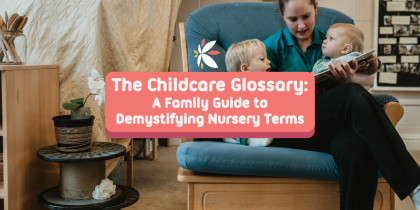
Blog
The Childcare Glossary: A Family Guide to Demystifying Nursery Terms
If you’ve landed here, chances are your little one has started, or is about to start at nursery. Now, we know that navigating through some of the language used in nurseries, pre-schools, and childcare facilities can feel like deciphering a secret code. But fear not! In this guide, we'll demystify some of the terms you may come across, helping you to feel more confident as you navigate your child's early educational journey.
Jump to...
Areas of Learning
Definition: Within the statutory framework for the early years foundation stage, there are 7 areas of learning and development. These 7 areas are split into two categories: The Prime Areas — Communication and Language, Physical Development and Personal, Social and Emotional Development (PSED) and The Specific Areas — Literacy, Mathematics, Understanding the World and Expressive Arts and Design.
Why it matters: These 7 areas are used by early years settings to shape their education programmes and to determine what children should learn and how children’s learning and development will be supported through each of these 7 areas.
Circle Time
Definition: A special time when children gather in a circle for various activities like singing, storytelling, and discussions.
Why it matters: Circle time promotes socialisation, communication skills, and a sense of community amongst our little learners.
EAL
Definition: EAL stands for English as an Additional Language
Why it matters: For children and families whose first language is not English, beginning nursery or pre-school can feel like a scary and alienating time, which is why there are provisions in place specifically for these families, striving to support children who are potentially bilingual and multilingual in all the languages available to them.
EYFS
Definition: EYFS stands for the Early Years Foundation Stage. This is the statutory curriculum for children accessing childcare and school in England from 0 - 5 years old.
Why it matters: The EYFS Framework explains how and what your child will be learning to support their healthy development. Your child will be learning skills, acquiring new knowledge and demonstrating their understanding through 7 areas of learning and development.
Fine Motor Skills
Definition: The coordination of small muscles, like those in the hands and fingers, used for activities such as drawing, writing, and buttoning.
Why it matters: Developing fine motor skills is essential for future academic success, as they are the building blocks for tasks like holding a pencil and tying shoelaces.
Forest School
Definition: Forest Schools are nature-based communities where trained practitioners nurture learner-led exploration and discovery, nurturing meaningful experiences for positive lifelong impacts.
Why it matters: This type of learning has numerous benefits, such as improved physical development and enhanced creativity, as well as allowing children to develop themselves through healthy engagement with risk, problem-solving and self-discovery, all within a natural outdoor environment. Click here to read more about our Forest Schools at Kindred Nurseries.
Funding
Definition: Funding typically refers to financial support provided by the Government to help families cover the costs of childcare services.
Why it matters: Funding is designed to make early education and childcare more affordable for parents and guardians, thereby promoting access to high-quality early learning opportunities for children. To read more about what funding may be available to you, click here.
Gross Motor Skills
Definition: Gross Motor Skills refer to the development and coordination of the large muscles of the body. These skills involve the movement and control of the whole body or major parts of it, such as the arms and legs.
Why it matters: Gross Motor Skills are crucial for a child's physical development and play a significant role in their ability to engage in various physical activities and navigate their environment.
Key Person
Definition: The key person is an identified staff member who takes on a special role in building a close, supportive relationship with an individual child and their family.
Why it matters: The Early Years are a crucial time for a child's emotional development, which is why the EYFS promotes a small group of children having a 'key person' who will provide a caring and secure relationship in their setting, taking note of the child's individual needs and being a key point of contact for parents and carers. This relationship is intended to provide continuity and a sense of security for the child within the childcare setting.
Loose Parts
Definition: Loose parts play is an open-ended and creative form of play that involves using a variety of materials, objects, and items that can be moved, carried, combined, redesigned, and manipulated by children. In this type of play, the materials are considered ‘loose parts’ because they can be easily moved and used in many different ways.
Why it matters: Loose parts play encourages imagination, creativity, problem-solving, and collaboration among children. Loose parts can include natural materials like sticks, stones, leaves, as well as man-made items such as fabric scraps, cardboard boxes, and plastic containers.
Montessori
Definition: Montessori refers to an educational approach developed by Dr. Maria Montessori, an Italian physician and educator from the early 20th century. The Montessori method is characterised by a child-centred philosophy that emphasises independence, freedom within limits, and a hands-on approach to learning. The Montessori approach is widely recognised for its unique environment, materials, and teaching methods that aim to nurture the physical, intellectual, emotional, and social development of children.
Why it matters: Montessori education is designed to support the overall development of the child—cognitive, social, emotional, and physical. It places emphasis on self-directed learning, fostering independence and a love for learning, preparing children for a lifetime of curiosity and exploration.
Observation
Definition: Observation refers to the systematic process of watching and documenting a child's behaviours, interactions, and activities in an educational or childcare setting. They are a fundamental aspect of the EYFS.
Why it matters: Observations help to create a curriculum that is responsive to the unique characteristics of a child. Through careful observation, practitioners can identify any additional support or interventions that may be required for individual children. This ensures that each child receives the necessary guidance and resources to thrive. Observations also provide valuable insights into a child's daily experiences and achievements, which are then shared with parents and carers, involving them in their child's learning journey and promoting collaborative support.
Ofsted
Definition: Ofsted stands for Office for Standards in Education, Children's Services and Skills. They are the non-ministerial Government department in the United Kingdom responsible for inspecting and regulating institutions and services that provide education, children's services, and skills training.
Why it matters: Ofsted inspections help ensure that educational and childcare providers maintain high standards, providing reassurance to parents and the wider community about the quality of services. Parents and caregivers can use Ofsted reports and ratings to make informed decisions about the best educational and childcare options for their children.
Open Day
Definition: An Open Day typically refers to an event organised by a childcare facility, where prospective parents and families are invited to visit the premises, meet the staff, and learn more about the services offered.
Why it matters: Visiting a Nursery or childcare facility on their Open Day can be a fantastic chance for families who may not be able to attend to view a setting during their usual opening hours to come and ask questions, view the facilities and meet the staff. Click here to read a little more about what a typical Kindred Open Day looks like.
PANco
Definition: A Physical Activity and Nutrition Coordinator (PANco) is a specialist role which acts as a beacon for quality provision in the Early Years.
Why it matters: The role of PANco has been designed as a wellbeing-in-action intervention that promotes positive nutrition and physical activity. It links closely to local and national strategies, including the obesity strategy. To find out a bit more about PANcos at Kindred Nurseries, click here.
Pedagogy
Definition: Pedagogy refers to the theory and practice of teaching, instructing, and educating. It encompasses the methods, strategies, and techniques employed by educators to facilitate learning and foster the intellectual, social, and emotional development of learners.
Why it matters: A well-crafted pedagogy enhances the quality of education, fostering an environment where even our littlest learners can thrive academically, socially, and emotionally. At Kindred, we are incredibly proud to have written our own Pedagogy, something that every member of our team accesses and implements.
Play Based Learning
Definition: Play Based Learning is an approach to early education that uses play as the primary vehicle for learning
Why it matters: Play-based learning encourages curiosity, imagination, and social skills while making education enjoyable and meaningful for young minds.
Practitioner
Definition: A Practitioner, also known as a nursery practitioner or early years practitioner, is a professional who works in a nursery setting or early years education environment, providing care, support, and educational experiences for young children.
Why it matters: Nursery practitioners contribute significantly to the early years of a child's life, influencing their development, learning experiences, and overall well-being. Their dedication, expertise, and care create a foundation for children to thrive and succeed in their educational journey.
Schema
Definition: In the context of early childhood development and education, the term "schema" refers to patterns of repeated behaviours or actions that children exhibit as they explore and make sense of their world. Common schemas include transporting (moving objects from one place to another), enveloping (wrapping or covering objects), positioning (arranging items in a certain way), and rotating (turning or spinning objects).
Why it matters: These repeated actions or behaviours reflect a child's natural inclination to explore, experiment, and build understanding through hands-on experiences. Understanding and recognising schemas in children's play can help educators and caregivers provide more meaningful and targeted learning experiences that align with children's developmental needs and interests.
Sensory Play
Definition: Activities that stimulate a child's senses, including touch, smell, taste, sight, and hearing.
Why it matters: Sensory play enhances cognitive development, creativity, and problem-solving skills by engaging children in a hands-on exploration of their surroundings.
